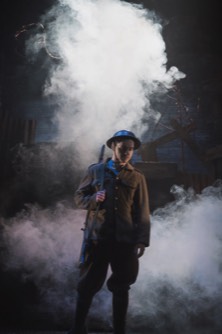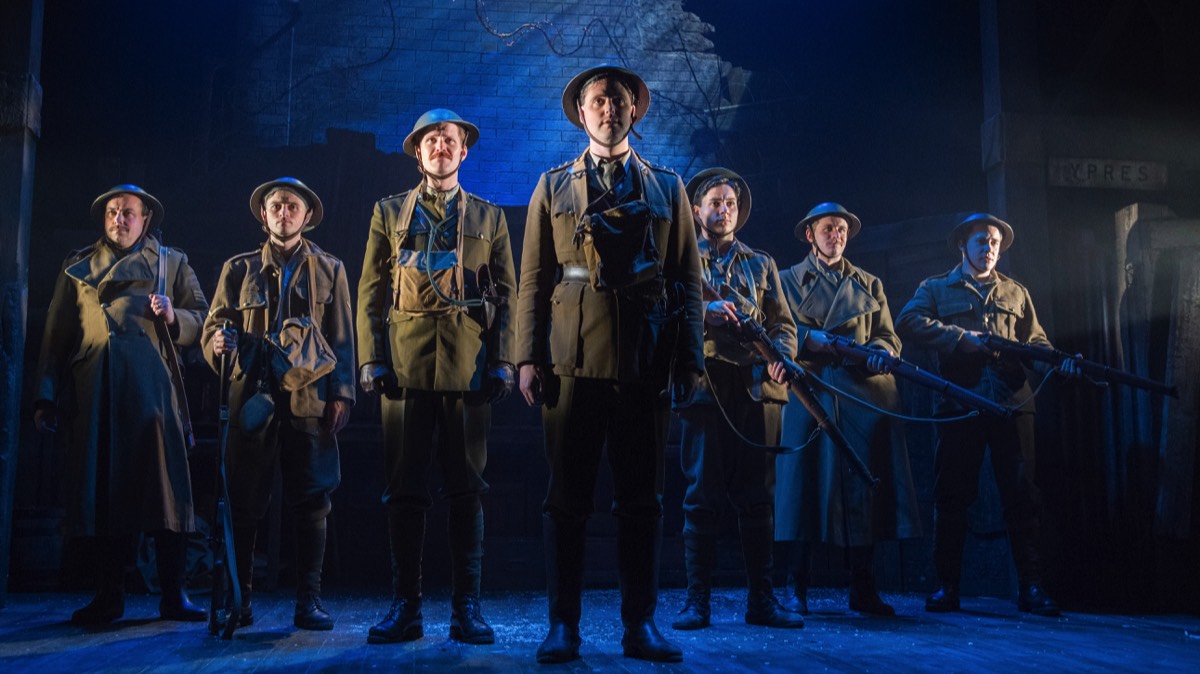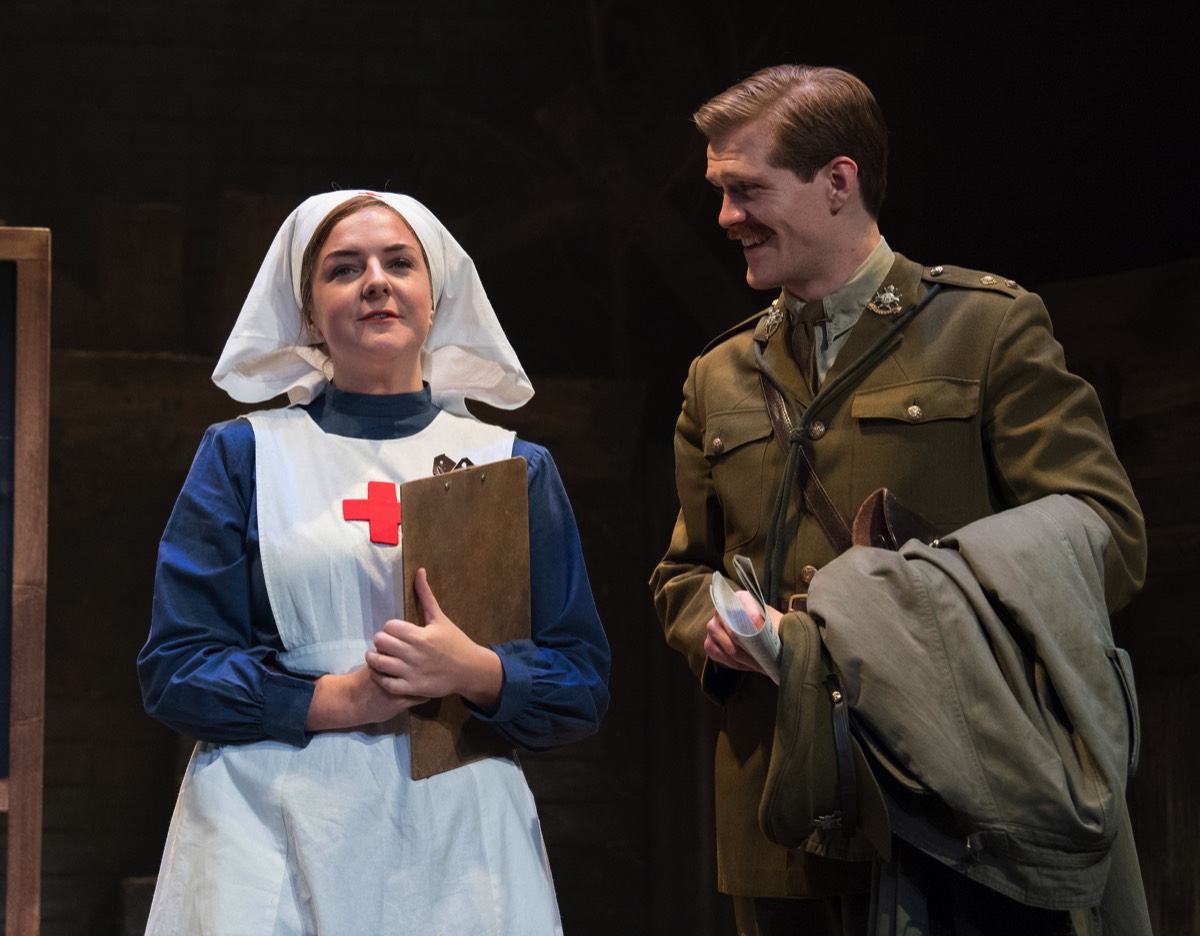THEATRE
Surrey’s Premier Lifestyle Magazine
The Wipers Times

Q What first sparked your interest in The Wipers Times, Ian?
A (Hislop) I was presenting a documentary about the First World War and I came across a reference to The Wipers Times and a joke quoted from one issue. I followed it up and I could see it made the most brilliant story which was much too good to be used in a mere documentary.
A (Newman) I’d never heard of The Wipers Times, but what was so extraordinary about it was the fact that it was original source material, written on the frontline by troops on active service. What stood out was that it was genuinely funny and the jokes had survived the test of time. We wanted to revisit the material in some way so we wrote a three page document about how we’d recreate the theatre of war. We put the idea of making a film about The Wipers Times to the BBC and we then heard nothing – for ten years!
Q Why did you have such trouble trying to sell the idea?
A (Hislop) Even our wonderful producer David Parfitt thought nobody was interested in the First World War.
A (Newman) David was quite honest about it. In the current climate – this was in 2003 or so – nobody was interested in the subject. Then, during the following years, along came Birdsong by Sebastian Faulks, War Horse at the National and then the West End and the Spielberg film. Even David produced Parade’s End which was set at the time of the First World War. Paradoxically this revival of interest in the period worked against us. Who’d want to put on a play or make a film set in World War One when Birdsong and War Horse had been so successful? Then, completely out of the blue, we got a commission to make a drama documentary about The Wipers Times for the BBC as one of the programmes marking the centenary of the war.
Q Do you think you had such trouble because you were concentrating on a very different aspect of the First World War?
A (Newman) That’s exactly right. The whole experience of World War One has been coloured by the poets publishing in the 1920s and the memoirs and dramas written in the 1930s. Audiences had seen things explode before and they were looking for a different experience. What The Wipers Times was doing at the time was putting a smile back on people’s faces.
A (Hislop) Sometimes you get the impression that nobody ever laughed during the period between 1914 and 1918. The soldiers fell on The Wipers Times like thirsty men finding water in the desert.

All images previous production of The Wipers Times
Q How would you describe the material in The Wipers Times?
A (Hislop) It’s a very good mix. I’d say that the material written by other ranks lacked the elegance of the pieces submitted by the officers. You get the sense from the images of two very different worlds, of different versions of what was happening. On the face of it, it is all jolly poems and spoofs, but it is also very subversive. There is a letter from a reader, asking for advice. Is it permissible, he asks, to shoot a superior officer? He receives the reply that it is, given extenuating circumstances. I feel as if Nick and I are kindred spirits of the editors, Jack Pearson and Fred Roberts. They are our heroes, eking out this wonderful newspaper under incredibly difficult circumstances.
A (Newman) The war is treated in a quintessentially British way. There are jokes about the Germans – about the Kaiser’s little Willie (i.e. the Crown Prince) and so on. But there’s no malice in it. If anything the soldiers reserve their malice for their own superior officers and for the pointlessness of it all.
Q You eventually got your film made. Why did you then want to adapt this story for the stage?
A (Hislop) All the way through the process, we’d always thought of it as a play.
A (Newman) The film got such a fantastic response that we felt it wasn’t going to represent the end of the story after all. We’d written our first play, A Bunch of Amateurs, as our first attempt at writing for the stage which had been produced at the Watermill Theatre near Newbury. That had gone down so well that the Watermill told us that if there was anything else we wanted to do, they’d be interested in seeing it. So we suggested joining forces on The Wipers Times.
Q What happened to your two heroes, Fred Roberts and Jack Pearson?
A (Newman) During the period after the film came out, we were sent much more material, including a memoir by Roberts. But what had happened to Pearson was a complete mystery.
A (Hislop) I was convinced he’d disappeared, but I happened to mention what I was looking for to a member of the amazing team who’d worked on my Who Do You Think You Are? programme and within a day she’d found Jack. He’d survived the war and worked as a civil engineer. He had travelled out to Argentina on a P&O ship where he’d got married and then settled down.
A (Newman) We then heard from Pearson’s granddaughter who sent us a piece he’d written about the experience of Ypres, but which was too late for inclusion in the film.
Q How did the families react to the play?
A (Hislop) I was the initial contact and I spoke to Roberts’ grandchildren when they saw the play at the Watermill. They told us that we’d got ‘Pops’ off to a tee. Pearson’s granddaughter was very moved. She said that the play helped her gain a better understanding of her grandfather. When as a child she’d ask him about his experience of the war, he joked that he had such long legs he could easily run away from the Germans.
Q There were a number of other trench journals apart from The Wipers Times. What made it so special?
A (Hislop) It was funnier – and ruder! I have a friend who is a captain in the Royal Engineers and she brought a party of her sappers to see the show. I was a little worried about how it would go down with the men, but she reassured me. She said that the way the men were represented was exactly how the guys behaved. And that’s the same now.
Q Which injustice has been righted as a result of The Wipers Times?
A (Newman) When the film was shown, an email arrived from John Witherow, the editor of The Times, congratulating us. I then took the opportunity to point out to John that neither Pearson nor Roberts had received the proper recognition of an obituary in The Times. A fortnight later we received an e-mail with the brief instruction to look in the next day’s newspaper. And there they were. It had been a travesty of justice that they had been overlooked and now justice had been done. Sometimes satire can do something good.
A (Hislop) It’s a very good mix. I’d say that the material written by other ranks lacked the elegance of the pieces submitted by the officers. You get the sense from the images of two very different worlds, of different versions of what was happening. On the face of it, it is all jolly poems and spoofs, but it is also very subversive. There is a letter from a reader, asking for advice. Is it permissible, he asks, to shoot a superior officer? He receives the reply that it is, given extenuating circumstances. I feel as if Nick and I are kindred spirits of the editors, Jack Pearson and Fred Roberts. They are our heroes, eking out this wonderful newspaper under incredibly difficult circumstances.
A (Newman) The war is treated in a quintessentially British way. There are jokes about the Germans – about the Kaiser’s little Willie (i.e. the Crown Prince) and so on. But there’s no malice in it. If anything the soldiers reserve their malice for their own superior officers and for the pointlessness of it all.
Q You eventually got your film made. Why did you then want to adapt this story for the stage?
A (Hislop) All the way through the process, we’d always thought of it as a play.
A (Newman) The film got such a fantastic response that we felt it wasn’t going to represent the end of the story after all. We’d written our first play, A Bunch of Amateurs, as our first attempt at writing for the stage which had been produced at the Watermill Theatre near Newbury. That had gone down so well that the Watermill told us that if there was anything else we wanted to do, they’d be interested in seeing it. So we suggested joining forces on The Wipers Times.
Q What happened to your two heroes, Fred Roberts and Jack Pearson?
A (Newman) During the period after the film came out, we were sent much more material, including a memoir by Roberts. But what had happened to Pearson was a complete mystery.
A (Hislop) I was convinced he’d disappeared, but I happened to mention what I was looking for to a member of the amazing team who’d worked on my Who Do You Think You Are? programme and within a day she’d found Jack. He’d survived the war and worked as a civil engineer. He had travelled out to Argentina on a P&O ship where he’d got married and then settled down.
A (Newman) We then heard from Pearson’s granddaughter who sent us a piece he’d written about the experience of Ypres, but which was too late for inclusion in the film.
Q How did the families react to the play?
A (Hislop) I was the initial contact and I spoke to Roberts’ grandchildren when they saw the play at the Watermill. They told us that we’d got ‘Pops’ off to a tee. Pearson’s granddaughter was very moved. She said that the play helped her gain a better understanding of her grandfather. When as a child she’d ask him about his experience of the war, he joked that he had such long legs he could easily run away from the Germans.
Q There were a number of other trench journals apart from The Wipers Times. What made it so special?
A (Hislop) It was funnier – and ruder! I have a friend who is a captain in the Royal Engineers and she brought a party of her sappers to see the show. I was a little worried about how it would go down with the men, but she reassured me. She said that the way the men were represented was exactly how the guys behaved. And that’s the same now.
Q Which injustice has been righted as a result of The Wipers Times?
A (Newman) When the film was shown, an email arrived from John Witherow, the editor of The Times, congratulating us. I then took the opportunity to point out to John that neither Pearson nor Roberts had received the proper recognition of an obituary in The Times. A fortnight later we received an e-mail with the brief instruction to look in the next day’s newspaper. And there they were. It had been a travesty of justice that they had been overlooked and now justice had been done. Sometimes satire can do something good.

“I saw Emlyn Williams as Dylan Thomas and Max Adrian as Shaw and another one based on Trollope’s Barchester novels which wasn’t exactly the talk of the town. However, I enjoyed the Trollope and what it suggested to me was that it was perfectly possible for an audience to be very happy simply listening to one man.”
Should anything go awry during the performance, Fox only has himself to get out of trouble, but he is undaunted by the prospect.
“Technique can help and I find that learning the lines is a pretty straightforward task provided you work methodically at it. People outside the business don’t realise that most of an actor’s work takes place in the home, learning the lines. Margaret Thatcher once asked me: “Do you have an office, Mr. Fox?” I replied that I had – on the streets and in the field. I don’t think she was very impressed.”
Fox and his companion, the actress Joanna David, have two children, Emilia, star of Silent Witness, and Freddie, who recently played Romeo both in Sheffield and London.
“Neither Joanna nor I ever suggested to them that they should go on the stage or not. It was their decision and as children of actors they knew that it is not a glamorous profession. It does worry me, however, that young actors these days no longer have the ability to train at one of the regional repertory theatres where we learned our craft. They leave drama school, acquire an agent and they go into television or are cast in a film. It is a very makeshift way to start.”
Given the list of Fox’s credits outside London, it is no surprise that he has a number of associations with the theatres Sand in the Sandwiches will visit.
“Joanna and I met in Chichester, I worked at Salisbury Rep under Reggie Salberg and appeared in a play at Oxford with Sybil Thorndike, and I have known Jamie Barber at Guildford for a number of years.”
Fox returns to the subject of John Betjeman. “He wanted to be a poet from a very early age and Betjeman regarded the writing of poetry as a duty and as a service. He was popular with the public, but not with the world of academe who were rather snobbish about him, and he had enormous periods of depression when he doubted the worth of his poetry. He saw himself as a sieve, sorting out words and ideas so that people could understand. He was quick-minded, witty and very human and he generally wrote about the more positive aspects of life. Working on this play, I’ve been both stimulated and invigorated by the man and I hope that audiences will feel the same.”
Sand in the Sandwiches first premiered at Oxford Playhouse on 25 October 2016 and went on to enjoy a sell-out tour. The production returns this year with a strictly limited run in the West End at the Theatre Royal Haymarket followed by a national tour until 15 July 2017, including a run at the New Victoria Theatre, Woking from Friday 16 to Saturday 17 June.
Should anything go awry during the performance, Fox only has himself to get out of trouble, but he is undaunted by the prospect.
“Technique can help and I find that learning the lines is a pretty straightforward task provided you work methodically at it. People outside the business don’t realise that most of an actor’s work takes place in the home, learning the lines. Margaret Thatcher once asked me: “Do you have an office, Mr. Fox?” I replied that I had – on the streets and in the field. I don’t think she was very impressed.”
Fox and his companion, the actress Joanna David, have two children, Emilia, star of Silent Witness, and Freddie, who recently played Romeo both in Sheffield and London.
“Neither Joanna nor I ever suggested to them that they should go on the stage or not. It was their decision and as children of actors they knew that it is not a glamorous profession. It does worry me, however, that young actors these days no longer have the ability to train at one of the regional repertory theatres where we learned our craft. They leave drama school, acquire an agent and they go into television or are cast in a film. It is a very makeshift way to start.”
Given the list of Fox’s credits outside London, it is no surprise that he has a number of associations with the theatres Sand in the Sandwiches will visit.
“Joanna and I met in Chichester, I worked at Salisbury Rep under Reggie Salberg and appeared in a play at Oxford with Sybil Thorndike, and I have known Jamie Barber at Guildford for a number of years.”
Fox returns to the subject of John Betjeman. “He wanted to be a poet from a very early age and Betjeman regarded the writing of poetry as a duty and as a service. He was popular with the public, but not with the world of academe who were rather snobbish about him, and he had enormous periods of depression when he doubted the worth of his poetry. He saw himself as a sieve, sorting out words and ideas so that people could understand. He was quick-minded, witty and very human and he generally wrote about the more positive aspects of life. Working on this play, I’ve been both stimulated and invigorated by the man and I hope that audiences will feel the same.”
Sand in the Sandwiches first premiered at Oxford Playhouse on 25 October 2016 and went on to enjoy a sell-out tour. The production returns this year with a strictly limited run in the West End at the Theatre Royal Haymarket followed by a national tour until 15 July 2017, including a run at the New Victoria Theatre, Woking from Friday 16 to Saturday 17 June.
essence info
The Wipers Times is currently on tour and will be at Richmond Theatre from Tuesday 26 to Saturday 30 September.Websites: www.wiperstimesplay.co.uk and www.atgtickets.com
“Have you ever sat in a trench in the middle of a battle and corrected proofs?”
The Wipers Times editor, Fred Roberts

